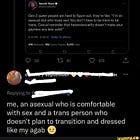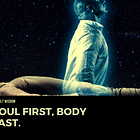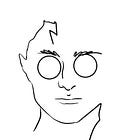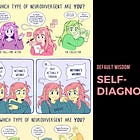What Is Default Friend All About?
Six years into being DF, here's a list of some of just some of the ideas I've been working on.
The following is a list of a few ideas I often return to in my work. It’s not exhaustive by any stretch of the imagination, but if you’re new here and want to get to know me, this is as good a place as any to start. I may end up making this a living document…
And if you have any questions about these ideas or what I believe, drop them below…
Everything is downstream of fandom—in two ways. This is probably what I’m best known for and what I’ve spoken about the least. Everything is downstream of fandom. Both in the sense that many of the quirks of modern culture are a direct result of the influence of media fandoms and that, overwhelmingly, the way we organize ourselves is fandom. So, not only are most political movements essentially fandoms, but pre-existing media fandoms, like those we saw on Tumblr in the 2010s, have impacted how we talk and think about ourselves. This started in the 1970s and became visible to everyone in 2015.
Media feedback loops set us up for wokeness (among other things). Wokeness, #MeToo, mental health crises, etc., have been as much a product of social media as the press. We routinely underestimate how much power even a dying media ecosystem has in creating and reinforcing narratives. The Press gives stories power, whether we respect journalists or the publications they write for. Digital media's changes in the 2010s were significant, from scraping stories from 4chan, Reddit, Twitter, and Tumblr to the invention of clickbait.
Taking online speech literally—or seriously—can be a recipe for misunderstanding. The distinction between sincere and insincere speech is extremely important in the digital age, particularly regarding content moderation. Even though this is how conversation works in the physical world, for some reason, online, there’s a temptation to take everyone at their word. The mainstream talks a lot about memes but takes this for granted.
We live in an imaginative age! The Internet is a text-based roleplaying game. I write a lot about the way people escape into media and, as a result, their minds. For a huge swath of the “Terminally Online,” the best way to think about the Internet is as a text-based roleplaying game. This was more obvious on the early Internet. You probably don’t remember MUDs or chatrooms, but I bet you remember when people say things like *glomp* or *hugs you*? Those little linguistic quirks were more significant than you think.
One of my more esoteric beliefs about Internet usage is that we’ve picked up a sort of sixth sense for “vibes” within text. Sometimes, we’re projecting something onto text that’s not there. I’ve described this mechanism many times before, using an example from Sherry Turkle’s Life on the Screen:
Sherry Turkle tells a story in her 1995 book Life on the Screen that, I think, answers Gerhardt’s question. It’s a story that has always haunted me, something anyone who has watched an episode of Catfish has seen happen in real time, even if they don’t realize what they’re watching unfold.
A couple falls in love online, and finally, after months of talking and, well, having cybersex, they decide to meet. Turkle writes of their encounter and their relationship leading up to it:
Peter, a twenty-eight-year-old lecturer in comparative literature, thought he was in love with a MUDding [text-based roleplay] partner who played Beatrice to his Dante (their characters’ names). Their relationship was intellectual, emotionally supportive, and erotic. Their virtual sex life was rich and fulfilling.
The description of physical actions in their virtual sex (or TinySex) was accompanied by detailed descriptions of each of their thoughts and feelings. It was not just TinySex; it was TinyLovemaking. Peter flew from North Carolina to Oregon to meet the woman behind Beatrice and returned home crushed. “[On the MUD] I saw in her what I wanted to see. Real life gave me too much information.”
Since it is not unusual for players to keep logs of their MUD sessions with significant others, Peter had something that participants in real-life relationships never have: a record of every interaction with Beatrice. When he read over his logs, he remarked that he could not find their relationship in them.
Where was the warmth? The sense of complicity and empathy?
Peter’s story points to something predictable—even painstakingly obvious—to those who aren’t so chronically plugged in.
But sometimes, something is there. Maybe it’s some kind of telepathic “sixth sense,” maybe it’s the text-based equivalent of “micro-expressions,” but it’s something, and it takes the place of body language.
Between us was a highway of information constantly moving back and forth, back and forth. And everything in this two-way stream felt valuable—the half-second differences between responses, the way certain words were spelled, the occasional changes in punctuation. A space between a word and a period—like this: “hi .”—was never good, for example. Over time, I learned that the distance between punctuation and word represented emotional distance.
In 2011, it seemed crazy. It probably sounds much less so today, in a world where we are always connected to one another. Back then, there was something a little novel about the idea that the volume of our communication had endowed us with a sixth sense (he felt it too)—one that could also sense something physical.
Affinity-based identity rules experience-based identity in a world where we’re freed from physicality. We define ourselves more based on how we feel and what we’re intuitively attracted to than what we do. I wrote about it at length here, where I discuss straight women who are attracted to “lesbianness” but aren’t necessarily lesbians. Because we don’t live the same way we used to, certain identities have been reduced to an often inarticulable feeling. Written text that “feels” female is an example that might be accessible to anyone reading this. I also believe this explains phenomena like neo-pronouns.
This, too, has implications for what is and isn’t a lie. Enter: “emotional truths.” In 2023, I had the misfortune of meeting and, thankfully, briefly befriending a pathological liar. This individual lied about everything—even mundane things. But the closer I paid attention, the more it was clear that they lied so much because they weren’t really living in the physical world. They were creatures of the Internet, through and through. The stories were a way to communicate what their essence was. They weren’t literally true, but they were symbolically true. But this principle is wider spread than just people who fib online or in more extreme circumstances, catfishers. This is what it means to be “post-truth.” There may not literally be a cabal of Satanists running the world (okay, bad example, but it’s the one I have on hand), but there’s a sense in which it’s “emotionally” true.
The Internet is a place, not a communication tool. This has been one of my talking points for a minute. I say it in almost every interview I give. I'm working on a more in-depth piece on it. An important one! So, because I say it over and over, I'll keep it short and sweet: The Internet is a place, but it's not like any other place. It's more like the Astral Realm.
Emo was the blueprint. There is a short list of digital subcultures foundational to understanding how internet culture developed, but none so vital as emo. Emo had everything: fandom, commercialization, the fluidity of gender and sexuality, gatekeeping drama, social media, strip-mining your private life for attention, grooming, the medicalization of identity, the creation of a collective sense of belonging through shared experiences of marginalization and victimization, sociogenic illness, a highly politicized moral panic… music, fashion, a coherent aesthetic. Emo for understanding internet culture—trust me.
Aegosexuality is the sexuality of the disembodied. Aegosexuality, sometimes referred to as autochorissexuality, is a sexual orientation on the asexual spectrum characterized by a disconnect between oneself and the subject of sexual fantasies or arousal. Individuals who identify as aegosexual may experience sexual fantasies, enjoy erotica or pornography, or even masturbate, but they typically do not desire to engage in sexual activities with others. In other words: it is the Internet’s own sexuality.
Nihilism downstream from disembodiment causes violence. We underestimate how much one can mentally and physically check out from "Internet Overexposure Syndrome." Some people become over-emotional, but I suspect others cease to feel anything, allowing them to engage in behaviors they wouldn't otherwise be capable of. In early books about the Internet, like The Cybergypsies or The Joy of Cybersex, the writers illustrate how people can bifurcate their identities and engage in digital affairs. It's also visible in how desensitized people become to certain content: many people who post gore (or worse) probably don't have some special psychopathic disposition; the Internet made them this way. In extreme cases, I think it theoretically can make people capable of acts of violence.
Culture isn’t stuck. Old media is dead, and we under-appreciate the new forms because they’re somehow ‘less legitimate’ than the old ones. The collaborative storytelling that goes into creating an Internet persona, algorithms, mood boards, and even certain types of uniquely online sketch comedy are all new or evolved art forms. And they’re thriving. We just don’t take them seriously.
Porn is everywhere! Not all porn is a literal depiction of sexual activity. Weird cooking videos are just one example of porn that doesn’t look the way we expect porn to look. It all scratches the same strange libidinal itch.
The Internet conditions people to develop the traits of autism, Borderline Personality Disorder, or, sometimes, paranoid schizophrenia.
On a long enough timescale, all journalists, celebrity academics, and public intellectuals become lolcows. The people who tend to become academics, writers, and intellectuals aren’t the same people who should be Internet personalities, but the former necessitates the latter. Hell, even most Internet personalities shouldn’t be Internet personalities. Eventually, I think media people will start demanding change.
We all live in eternal adolescence, not because of the Internet but because of consumerism.
In the future, everyone will be seen exactly as they want to be seen for 15 minutes.













There's a lot more, but I publish too often to contain it to a single list...
Your thesis on emo is 🎯